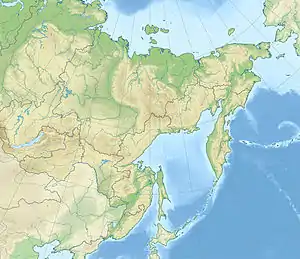1994 Kuril Islands earthquake
The 1994 Kuril Islands earthquake – also known as the Hokkaido Toho-oki earthquake – occurred on October 5 at 00:23:00 local time. The magnitude of this earthquake was put at Mw 8.2, or MJMA8.1. The epicenter was located at about 70 km east of Shikotan Island. The shaking and tsunami caused road and building damage. At least 10 people were reported dead.
 | |
| UTC time | 1994-10-04 13:23:00 |
|---|---|
| ISC event | 145456 |
| USGS-ANSS | ComCat |
| Local date | October 5, 1994 |
| Local time | 00:23:00 |
| Magnitude | 8.3 Mw [1] 8.1 MJMA [2] |
| Depth | 3 km (2 mi) [1] |
| Epicenter | 43.85°N 147.17°E [1] |
| Areas affected | Russia and Japan |
| Casualties | 10–12 dead 242–1,742 injured 1,200 homeless [3] |
Earthquake
This earthquake was an intra-slab earthquake within the Pacific Plate which is subducting beneath the Okhotsk Plate.[4][5]
Damage
Oil storage tanks in Malokurilsk and Krabozavodsk were damaged. An oil leak occurred and caused heavy contamination of the port area.[6]
Tsunami
A numerical simulation of the tsunami suggested that the first wave was caused by a significant subsidence north of the Kuril Islands due to the earthquake.[11]
A peak-to-trough tsunami wave height of 346 cm was recorded in Hanasaki, Japan.[10]
This earthquake triggered a tsunami in southern Kuril Islands and Hokkaido.[12] The tsunami run-up height was more than 3 m in Yuzhno-Kurilsk bay and 5 m in Zelenyi Island, Russia.[7]
See also
References
- ISC (2016), ISC-GEM Global Instrumental Earthquake Catalogue (1900–2012), Version 3.0, International Seismological Centre
- Cho, I.; Nakanishi, I.; Sato, T. (1999), "A feasibility test of CMT inversion using regional network of broad-band strong-motion seismographs for near-distance large earthquakes", Earth, Planets and Space, 51: 247, Bibcode:1999EP&S...51..247C
- USGS (September 4, 2009), PAGER-CAT Earthquake Catalog, Version 2008_06.1, United States Geological Survey
- Tanioka, Yuichiro; Ruff, Larry; Satake, Kenji (1995), "The great Kurile Earthquake of October 4, 1994 tore the slab" (PDF), Geophysical Research Letters, 22 (13): 1661, Bibcode:1995GeoRL..22.1661T, doi:10.1029/95GL01656
- http://www.iitk.ac.in/nicee/wcee/article/11_1599.PDF
- http://www.eeri.org/lfe/pdf/Japan_KurilIslands_Insert_Jan95.pdf
- Melentyev, A. M.; Eisenberg, J. M. (1996). An engineering analysis of the consequences of the Shikotan earthquake of October 4(5), 1994 (PDF). Eleventh World Conference on Earthquake Engineering. Paper No. 1256. ISBN 0080428223.
- http://www.pari.go.jp/search-pdf/no0802.pdf p5
- 高井, 伸雄; 鏡味, 洋史 (March 1996). "047 1994年北海道東方沖地震による釧路・根室・南千島の震度分布と建物被害(地震災害(1))". 日本建築学会北海道支部研究報告集 (69): 185–188.
- "Significant Earthquakes of the World 1994". Archived from the original on 2011-07-14. Retrieved 2017-08-28.
- "Generation of Tsunamis in the Okhotsk Sea Caused by the 1994 Great Kuril Earthquake" by Y. Tanioka
- "Data catalogue for near-source tsunami observed in Kuril Isls and Sakhalin Is". Archived from the original on 2012-04-01. Retrieved 2011-07-08.
External links
- The International Seismological Centre has a bibliography and/or authoritative data for this event.